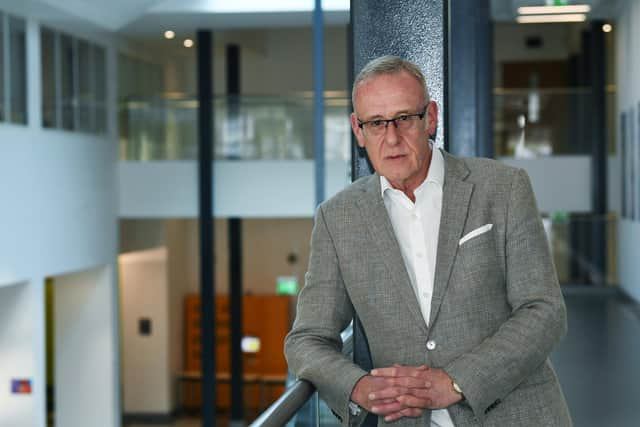Leeds sees 'concerning' rise in referrals to anti-extremism scheme Prevent


Data uncovered by the Yorkshire Evening Post shows there was a 65 per cent increase in the number of referrals made during the first quarter of the year, compared to the same period last year.
The rise is far higher than any other areas of the region, with only Bradford and Kirklees also reporting increases, but at 16 per cent and 13 per cent respectively.
Advertisement
Hide AdAdvertisement
Hide AdIt also bucks a national trend which has seen Prevent referrals decrease during the Covid-19 lockdown, according to police chiefs.


Prevent is part of the Government's counter-terrorism strategy which tackles all forms of terrorism, including Islamist and extreme right wing, by trying to safeguard those at risk of radicalisation.
The surge in cases in Leeds between January and April has raised fears that the Covid-19 lockdown could have led to more people being exposed to extremist material online.
The figures were reported in Leeds Community Healthcare NHS Trust's (LCHT) annual safeguarding report which said the pandemic had caused a "huge change to daily life [which] has resulted in increasing community tensions, fake news and increased online usage by many".
Advertisement
Hide AdAdvertisement
Hide AdWith a total of 28 referrals during the first quarter, compared to 17 in the same period last year, Leeds had the second highest total in West Yorkshire, just one less than Bradford's 29.
Nearly a third of the city's referrals were made by non-counter terrorism police, closely followed by schools.
Steph Lawrence, director of Nursing and Allied Health Professionals at LCHT, said: “The information contained in this report is taken from the CTLP (counter-terrorism local profile) and is generated annually by the police.
"Leeds Community Healthcare, alongside all its citywide healthcare partners, has a shared response and approach to delivering the PREVENT duty in a consistent and united manner and we continue to work together to deliver this”.
Advertisement
Hide AdAdvertisement
Hide AdLeeds Imam Qari Asim, who is also a Government adviser in his role as deputy chair of the Anti-Muslim Hatred Working Group, said the spike in Leeds is a "huge concern" and more needs to be done to investigate the reasons why.
While stressing a referral itself does not mean someone is an extremist he nevertheless added: "It is a huge concern for multiple reasons.
"Firstly, the bombers of the first major attack taking place on our soil came from Leeds, the 7/7 attackers, and over the years we have worked tirelessly - all the network of organisations, the city council, the law enforcement agencies, the community groups - to ensure that extremism is rooted out of the city.
"I think to credit all of those organisations we have been very successful in ensuring that something like that doesn't happen again in our country and especially our county.
Advertisement
Hide AdAdvertisement
Hide Ad"[But] this rise here, given the decrease nationally, [means] we obviously need to look at this further to see why is that and what are the factors behind it?"
Mr Asim said he suspected there had been an increase in far right extremism during Covid-19 and cited incidents in the city - which were reported to the police - where people had pretended to be independent journalists to take pictures of mosques and ask if anyone had been going in during lockdown.
He said: "It goes to show that there was a concerted effort to pick holes and to try and blame people for the spread of Covid 19.
"Potentially that has contributed to these figures."
The safeguarding report also cited examples of far right extremism seen in Leeds during the first quarter of the year.
Advertisement
Hide AdAdvertisement
Hide AdThese included propaganda found at Leeds train station in February and graffiti of a number of swastikas seen around the LS9 area in March.
Mr Asim said Leeds has "hot pockets" of far right extremists, with the city chosen as the venue for various recent protests, adding: "It is concerning in a vibrant, dynamic city like this, if far right extremism is growing - what are the factors behind it and how can we tackle it?"
He also suggested the Brexit debate could potentially have led to radical views: "I think people voted for different reasons, quite rightly, but I think some people treated Brexit as an opportunity to show their hate to minority communities."
Dr David Lowe, a senior research fellow Leeds Beckett University who is involved in the Prevent programme and is a member of the All Party Parliamentary Committee to advise on the strategy, said it was a distinct possibility that lockdown could have led to more people being exposed to content online.
Advertisement
Hide AdAdvertisement
Hide Ad"There is the danger that there are those who have got more time on their hands who want to start looking at some extremist material online and may get influenced," he said, adding that Prevent exists to safeguard these people, helping them before they get into trouble - and it could be family members noticing and making the referral.
"I think it's a concern if you're looking at an area which has seen a spike, or an increase. But it seems as though the system is working, the strategy is working and people have confidence [in referring] - that this individual can be helped."
He said extreme far right graffiti and propaganda is one of the ways such groups choose to communicate.
"That shouldn't be a surprise to people. They are still there - still lurking and trying to actively recruit.
Advertisement
Hide AdAdvertisement
Hide Ad"There is an issue with extreme far right in Britain. There are certain areas around Leeds which are going to have this, where people will be lured into that neo-nazi ideology."
He said counter-terrorism concerns in areas such as this are also compounded because of issues with radical Islamism.
"Leeds and West Yorkshire does have that sort of demographic make-up, of these two issues and people leaning towards them."
The Counter Terrorism Policing North East team told the Yorkshire Evening Post it was not possible to provide a breakdown of the referrals into extremist categories.
Advertisement
Hide AdAdvertisement
Hide AdSupt Matt Davison, its regional head of Prevent, said: “At a time [COVID-19 lockdown] where nationally Prevent referrals have seen a decrease, it is important to highlight that these statistics show that people in West Yorkshire are still contacting the police and our partners with their concerns, trusting we will respond proportionally and with sensitivity."
He said family and friends are often best placed to spot changes indicating a person is being preyed on by "dangerous radicalises" and early intervention is key.
"It is far better to stop a loved one getting drawn into criminal activity in the first place," he said, adding:“We’d urge anyone who is worried about someone they know to visit the Let’s Talk About It website for more information, or to share their concerns with police. It’s vital we act quickly to prevent people from being drawn too far down a path of violent extremism or terrorism.
“By working together and intervening early we can safeguard those most at risk of radicalisation and better protect them and our communities from harm."
Advertisement
Hide AdAdvertisement
Hide AdRegarding the propaganda and swastikas' graffiti seen in Leeds, he added: “We work closely with our local policing colleagues and encourage the reporting of any material of concern in our communities as part of wider intelligence gathering.”
A spokeswoman for Leeds City Council said: “Confronting all forms of extremist behaviour continues to be a priority for the council and in building resilient, more sustainable and stronger communities, we work hard with our partners and local communities on a range of positive work through our Prevent programme, to address it and tackle it.
"The rise in referrals over the past year is reflective of both our proactive engagement work and the increasing confidence that people in communities in Leeds have in engaging with Prevent.
"We are in no doubt that success in safeguarding vulnerable individuals relies on a whole community approach and these figures are a testament to the work of the city in ensuring that early help and support is provided to those that need it most.”
Advertisement
Hide AdAdvertisement
Hide AdA message from the Editor: Leeds has a fantastic story to tell - and the Yorkshire Evening Post has been rooted firmly at the heart of telling the stories of our city since 1890. We believe in ourselves and hope you believe in us too. We need your support to help ensure we can continue to be at the heart of life in Leeds.
Subscribe to our website and enjoy unlimited access to local news and information online and on our app. With a digital subscription, you can read more than 5 articles, see fewer ads, enjoy faster load times, and get access to exclusive newsletters and content. Click here to subscribe. For more details on our newspaper subscription offers click here.
Thank you
Laura Collins